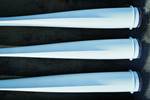ECORES WIND builds on wind blade circularity initiatives
Latest Horizon Europe project seeks to introduce innovative circular resins combined with advanced disassembly strategies, enabling cost-effective blade decommissioning and material reuse.
Consortium partners during a visit to Gaiker’s research center. Source | ECORES WIND
Horizon Europe-funded initiative kicked off in September 2024 in Bilbao, Spain. The project, led by private nonprofit Fundación Gaiker (Bizkaia, Spain), is contributing to the development of sustainable, environmentally conscious practices in the wind energy industry by providing a viable alternative to conventional resin systems tailored for composite structures.
Running for 42 months, ECORES WIND focuses on enhancing the circularity of wind turbine components, particularly wind blades, by developing resin system alternatives that promote recyclability, extended lifespan and enable an efficient decommissioning processes.
The project includes a from across Europe, including research institutions, universities and industry stakeholders. The diverse expertise of the partners will ensure a comprehensive approach to tackling the project’s objectives.
Wind energy plays a critical role in enabling the European Union to decarbonize and develop a clean, resource efficient, and carbon-neutral future. Its current infrastructure used for clean electrical energy generation is, paradoxically, a source of contamination. Wind farms also have a finite operational lifetime, bringing up end-of-life (EOL) considerations; many of Europe’s onshore wind farms are approaching the end of their planned operational lifetime.
The strategies to address the replacement or repowering of wind farms are complex, with legislative frameworks for repowering not yet in place. Most rotor blades are constructed from composite materials, including glass and carbon fiber, plastics,and resins which have a typical lifespan of 25 years and critically present challenges for recycling.
ECORES WIND’s key objectives and innovations will include the development of circular resin systems that enhance the recyclability and sustainability of wind turbine blades and incorporation of disassembly strategies to ensure that wind turbine blades can be decommissioned, and their materials reused efficiently. Furthermore, the initiative encompasses an ecological impact evaluation of aimed solutions: Ecological advantages of the developed resin systems will be evaluated and compared to state-of-the-art materials, aiming to establish benchmarks for improved sustainability in the wind energy sector.
Related Content
-
Development of a composite liquid hydrogen tank for commercial aircraft
Netherlands consortium advances cryogenic composites testing, tank designs and manufacturing including AFP, hybrid winding, welding of tank components and integrated SHM and H2 sensors for demonstrators in 2025.
-
Otto Aviation launches Phantom 3500 business jet with all-composite airframe from Leonardo
Promising 60% less fuel burn and 90% less emissions using SAF, the super-laminar flow design with windowless fuselage will be built using RTM in Florida facility with certification slated for 2030.
-
Plant tour: Teijin Carbon America Inc., Greenwood, S.C., U.S.
In 2018, Teijin broke ground on a facility that is reportedly the largest capacity carbon fiber line currently in existence. The line has been fully functional for nearly two years and has plenty of room for expansion.






